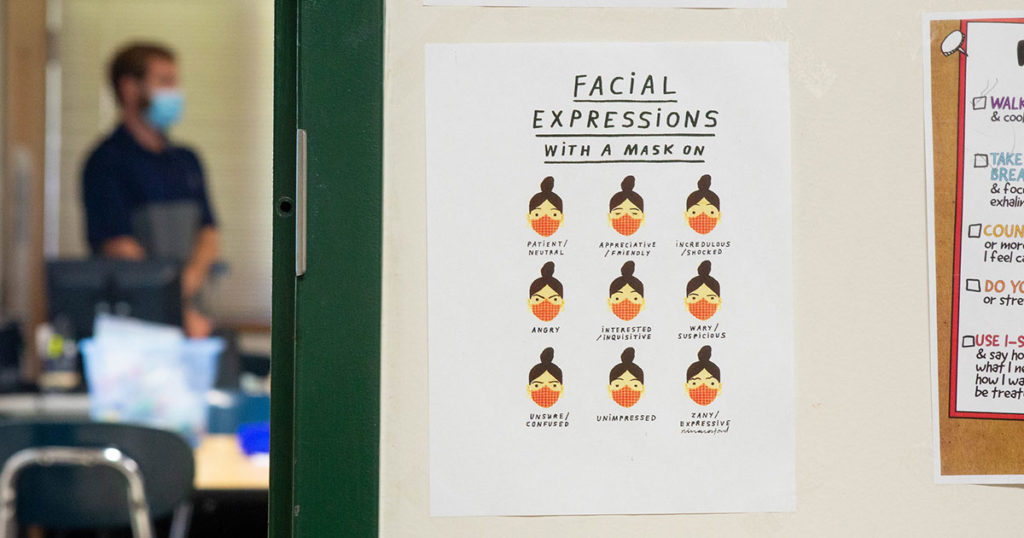
“I don’t mind dramas,” says Katie in Yiyun Li’s story “Hello, Goodbye,” when her friend asks if she regrets marrying the man she now plans to divorce. The friend reflects that Katie had entered her marriage with blind courage, the same as she herself had felt when having children. I remembered the story when, in an exercise about holidays, a student in my adult class said that she’d prefer the camping holiday to the sightseeing one or the mountain trekking one because she didn’t want strong emotions. She looked tired. Her mother had just come home from the hospital after an operation, but because of a tumor found during surgery, she would have to return for more surgery. “They didn’t get it all?” I asked. She shook her head. A biopsy showed that the tumor was malignant.
This student, like her three classmates, was a pleasant person. I liked her. Strangely, I’d liked her more ever since she had removed her mask in class, the last of the four to do so. The denuding of my students’ faces occurred over a two-week period in May, when masks were no longer required. Seeing these students maskless had in all four instances been a very great surprise. The first to remove his mask, a man in his mid-40s, turned out to have an unexpectedly lean face. His lips were thin and cheeks sunken, and the expression I read in his face with the added twist of his mouth was so much more expansive than before. I was astonished. Looking at his whole face, I wondered how I’d ever managed just seeing the eyes and forehead. I had been, in essence, peeking through my fingers like a child, getting a very restricted view, and now I couldn’t quit staring at him. I excused myself saying that it was such a surprise to see revealed what before I had merely imagined. He nodded and said he’d had the same experience. My eyes feasted on him. It was as if he’d come to class naked, and I couldn’t stop looking. Everything revealed was so perfectly fitting, so him, and yet so different from what I’d visualized. I was shocked at the attraction I felt when before I’d felt no particular attraction. My imagined student was gone, like the frog when a prince takes its place.
In this instance, however, the true person was not better looking that the substitute I’d imagined. In fact, I’d imagined him without imagining anything I could describe, and it wasn’t until I saw his face that I understood I’d imagined at all. Isn’t that how life works? You plow ahead into the great unknown of the future, and it isn’t until fate reveals itself that you realize that you’d had a vision at all. Often the reality is worse than the expected. In the case of this man, I was astonished at how much his now-revealed face added. The same with the second man, when he removed his mask to show a face much rounder than I’d expected, much more open. Then the first woman took her mask off, and I saw she was very pretty, which I hadn’t expected. Finally, the last student, the woman with the sick mother, took off her mask, and it turned out that she was much less pretty than I’d expected. In fact, she wasn’t pretty at all though I’d assumed she was, probably due to the combination of her appealingly skittish walk, her gangly body, beautiful woolly sweaters and tight jeans, and her long, thick hair. Her hair was like Sandra Bullock’s, and I’d given her a face like Bullock’s too. I preferred my student’s. That day her face was especially tired.
I asked if her mother knew about the diagnosis, and she shook her head. She was worried about her father too, who did know. What about your holiday, I asked, remembering that she had planned a trip to Madrid with a girlfriend during which she would take her first plane ride. She didn’t like dramas, but she’d been looking forward to the new experience. She’d had to cancel, she said. Instead of the drama of being airborne, she would have to face the drama of sickness and the specter of death. Blind courage was what she needed, and instead, knowing her mother and her father, she could see what she was in for. Her eyes, though heavy with fatigue, were fully open.

